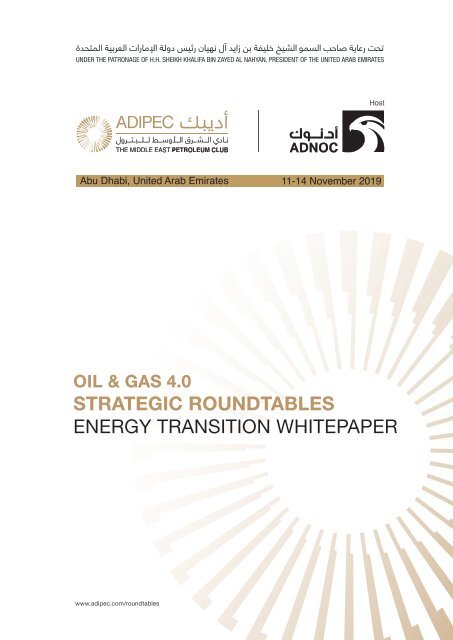ADIPEC Roundtable Whitepaper
You also want an ePaper? Increase the reach of your titles
YUMPU automatically turns print PDFs into web optimized ePapers that Google loves.
OIL & GAS 4.0<br />
STRATEGIC ROUNDTABLES<br />
ENERGY TRANSITION WHITEPAPER<br />
www.adipec.com/roundtables
FORWARD<br />
Innovation, transformation and agility are central to today’s oil and gas industry as it responds to the challenges<br />
and opportunities of the 4th industrial era. They enable organisations to move their strategic business choices at<br />
pace, and create new company structures, business models and diverse partnerships.<br />
At the Abu Dhabi International Petroleum Exhibition and Conference 2019 (<strong>ADIPEC</strong>), the strategic conference,<br />
Oil & Gas 4.0, featured six exclusive roundtables attended by ministers, policy makers, think tanks, CEOs and<br />
C-level executives, not only from leading international oil and gas companies, but also from the technology<br />
companies spearheading disruptive innovation in the industry globally.<br />
The discussions focused on key energy trends, policy formation and geopolitical factors affecting oil and gas<br />
companies, providing new and different perspectives and insights on the complexity of issues shaping the<br />
energy eco-system. Those who contributed their insights included:<br />
Mohammad Barkindo - Secretary General, Organisation of the Petroleum Exporting Countries (OPEC).<br />
Dr Daniel Yergin - Vice Chairman, IHS Markit<br />
Sebastian Thrun - CEO, KittyHawk; Co-Founder, Udacity;<br />
Adjunct Professor, Stanford; Former Vice President, Google; Founder,<br />
Google X Lab; Founder, GoogleGlass & Google Self Driving Car, Stanley<br />
Jason Bordoff - Professor of Professional Practice in International & Public Affairs and Founding Director<br />
Center on Global Energy Policy, Columbia University<br />
Rachael Bartels - Senior Managing Director Chemicals & Natural Resources, Accenture<br />
Greg Cross - Artificial Intelligence Pioneer, Serial Entrepreneur, Co-Founder and Chief Business Officer Soul<br />
Machines<br />
Stimulating, meaningful and open dialogue, ensured the roundtables generated a diverse range of insights in<br />
support of transformative actions that will help businesses to overcome the challenges inherent in continuing to<br />
deliver an affordable and sustainable energy supply.<br />
The content of this <strong>Whitepaper</strong> reflects how energy transition should be seen not only as a challenge but also<br />
an opportunity, one that would ensure the oil and gas industry remains a key enabler of tomorrow’s global<br />
economy.<br />
Christopher Hudson<br />
President<br />
dmg events - Energy<br />
www.adipec.com/roundtables<br />
1
CONTENTS<br />
FORWARD 1<br />
EXECUTIVE SUMMARY<br />
4<br />
<strong>ADIPEC</strong> 2019 ROUNDTABLES HOSTS<br />
6<br />
ROUNDTABLE OUTPUTS<br />
8<br />
ENERGY TRENDS, POLICY FORMATION AND GEOPOLITICAL FACTORS<br />
AFFECTING THE GLOBAL OIL AND GAS INDUSTRY<br />
8<br />
BUILDING A PATHWAY TOWARDS THE TRANSFORMATION OF THE<br />
WORLD’S ENERGY MIX<br />
9<br />
ADOPTING NEW CULTURES AND MIND SETS TO EMBRACE DIGITALISATION<br />
AND PREPARE FOR CONTINUED TECHNOLOGICAL DISRUPTION<br />
10<br />
HUMAN AND MACHINE COLLABORATION AND THE IMPACT THIS HAS ON<br />
BUSINESS TRANSFORMATION<br />
11<br />
BIG DATA TECHNOLOGY ADOPTION AND ENGAGEMENT IN THE OIL AND<br />
GAS INDUSTRY<br />
12<br />
CIRCULAR PLASTICS ECONOMY CONTRIBUTION TO THE GROWTH OF<br />
THE OIL AND GAS INDUSTRY<br />
13<br />
3
EXECUTIVE SUMMARY<br />
For over one hundred years, the oil and gas industry has been at the centre of the world’s energy system,<br />
enabling economic development and human progress. Hydrocarbons have not only provided energy for<br />
power and transportation, they are fundamental building blocks for making a wide-variety of every day items,<br />
including chemicals, plastics, pharmaceuticals, paints and fertilisers. It is estimated that around a quarter of<br />
every barrel of oil goes into non-transport or non-energy uses.<br />
So, for the foreseeable future hydrocarbons will continue to be a key enabler of growth and prosperity, as<br />
economic and political power shifts to the developing economies of the east. The key trends of population<br />
growth, energy poverty eradication and economic growth are positive signs for the industry. But, at the<br />
same time, alternative sources of energy are increasingly challenging the dominance of hydrocarbons,<br />
becoming more available and more affordable, creating a diversified energy mix where, by mid-century<br />
traditional and new forms of energy will be split almost equally between fossil and non-fossil sources.<br />
However, as the demand for energy continues to increase, the need for the oil and gas industry to adapt<br />
and change increases too. As it transitions to the new energy mix, the industry must grapple with a number<br />
of uncertainties surrounding energy policies; volatility of both prices and demand; its impact on national<br />
budgets and employment; the skills shortage and how best to integrate advanced digital technologies to<br />
capture operational efficiencies and maximise productivity, while maintaining cost and capital discipline.<br />
But perhaps the biggest uncertainty for the oil and gas industry lies in the much more pervasive<br />
environmental agenda being pushed forward, which calls for an accelerated transition to a low carbon<br />
economy. There are questions over how quickly decarbonisation can actually happen, what will act as<br />
catalysts to accelerate or decelerate it and crucially who will foot the bill for it?<br />
Consequently, as the pace of this energy transition accelerates and energy demand continues to rise, the oil<br />
and gas industry will come under increasing pressure to demonstrate it can provide secure and sustainable<br />
energy, while playing its part in decarbonising the global energy system to meet climate change mitigation<br />
targets.<br />
• The industry is being challenged to decarbonise, while at the same time it is expected to eradicate<br />
energy poverty and meet increasing global demand for energy.<br />
• Faced with rising energy demand, oil and gas producers need to continue to invest and explore and<br />
develop new fields, but their access to capital is likely to be more constrained by financial institutions<br />
under pressure to decarbonise their assets.<br />
• The extent to which oil and gas remains relevant in the future depends on how the industry responds to<br />
two main issues: methane and carbon dioxide emissions.<br />
4<br />
www.adipec.com/roundtables
• There needs to be greater transparency about the costs of the different sources of energy. There is a<br />
need for industry and government to work together to provide the accurate information people need to<br />
make informed decisions.<br />
• Digitalisation needs to be seen as the enabler, not the solution; helping companies identify problems<br />
unseen today and bringing new opportunities for the future.<br />
• Advanced digital technologies offer an opportunity for companies to completely reposition themselves,<br />
to drive new economics and establish new business models.<br />
• The industry must address the skills gap related to digitisation. Growing awareness of climate change<br />
and the demonisation of the hydrocarbons industry is making it harder to attract young people to oil and<br />
gas, but technologies such as Artificial Intelligence, Machine Learning, Robotics, Blockchain and Big<br />
Data provide a path to reconnect with this generation. Investing in the right people must be a priority for<br />
energy companies.<br />
• The plastics debate needs to be enlarged to remind the general public about all the benefits that plastics<br />
bring to society. The industry must articulate its concern about plastic leakage into the environment and<br />
communicate how it is responding to the challenge by redesigning products to be recyclable and more<br />
efficient.<br />
Enabling The<br />
Conversation On<br />
Energy Transition<br />
<strong>ADIPEC</strong> introduced six exclusive, closed<br />
door roundtables, attended by ministers,<br />
policy-makers, think tanks, CEOs and<br />
C-level executives.<br />
DIGITALISATION<br />
CIRCULAR PLASTICS<br />
ECONOMY<br />
BIG DATA<br />
HUMAN & MACHINE<br />
COLLABORATION<br />
ENERGY<br />
TRANSFORMATION<br />
POLICY FORMATION &<br />
GEOPOLITICAL FACTORS<br />
For more information or to participate in the Oil & Gas 4.0 Strategic <strong>Roundtable</strong>s at <strong>ADIPEC</strong> 2020<br />
please contact adipecroundtables@dmgevents.com or +971 2 444 4909<br />
5
<strong>ADIPEC</strong> 2019 ROUNDTABLES HOSTS<br />
His Excellency Mohammad Sanusi Barkindo<br />
Secretary General<br />
OPEC<br />
His Excellency Mohammad Sanusi Barkindo of Nigeria began his tenure as Secretary General of<br />
the OPEC on 1 August 2016.<br />
Over the years he also worked in several key roles at OPEC. In 1986, he was appointed to Nigeria’s<br />
delegation to OPEC, and from 1993 to 2008, served as Nigeria’s National Representative on the<br />
Organisation’s Economic Commission Board. In 2006, he was Acting OPEC Secretary General,<br />
and represented Nigeria on OPEC’s Board of Governors from 2009 to 2010.<br />
From 2009 to 2010, he was Group Managing Director and CEO of the Nigerian National Petroleum<br />
Corporation (NNPC). Previous to that, he served as Deputy Managing Director of Nigerian<br />
Liquefied Natural Gas. Earlier in his career, he was Special Assistant to former Minister of<br />
Petroleum Resources and OPEC Secretary General, HE Dr Rilwanu Lukman KBE.<br />
Mr. Barkindo has also been leader of Nigeria’s technical delegation to the UN climate change<br />
negotiations since 1991. He served as Chair of the Group of 77 and China at the UNFCCC and<br />
was elected to serve three terms as Vice President of the Conference of the Parties – COP13 (Bali,<br />
Indonesia), COP14 (Poznan, Poland) and COP15 (Copenhagen, Denmark), where he chaired the<br />
opening session.<br />
Dr Daniel Yergin<br />
Vice Chairman<br />
IHS Markit<br />
The Pulitzer-Prize winning author of “The Prize,” and “The Quest,” Dr. Yergin is vice chairman<br />
of IHS Markit and founded IHS CERA (now part of IHS Markit). He is an authority on energy,<br />
international politics and economics. His awards include Lifetime Achievement from the Prime<br />
Minister of India and the United States Energy Award for lifelong achievements in energy and the<br />
promotion of international understanding. He holds a Bachelor of Arts. from Yale University and a<br />
Ph.D. from Cambridge University, where he was a Marshall Scholar.<br />
Jason Bordoff<br />
Professor of Professional Practice in International and Public Affairs<br />
Founding Director, Center on Global Energy Policy<br />
Columbia University<br />
Jason Bordoff joined the Columbia faculty after serving until January 2013 as Special Assistant<br />
to the President and Senior Director for Energy and Climate Change on the Staff of the National<br />
Security Council, and, prior to that, holding senior policy positions on the White House’s National<br />
Economic Council and Council on Environmental Quality. One of the world’s top energy policy<br />
experts, he joined the Administration in April 2009. At Columbia’s School of International and<br />
Public Affairs, Bordoff is a professor of professional practice and serves as founding Director of<br />
SIPA’s Center on Global Energy Policy. Bordoff’s research and policy interests lie at the intersection<br />
of economics, energy, environment, and national security. He is a frequent commentator on TV<br />
and radio, including NPR, Bloomberg, CNBC and BBC, has appeared on the Colbert Report, and<br />
has published in the New York Times, Wall Street Journal, Financial Times and other leading news<br />
outlets. Prior to joining the White House, Bordoff was the Policy Director of the Hamilton Project,<br />
an economic policy initiative housed at the Brookings Institution. He is a member of the Council<br />
on Foreign Relations and the National Petroleum Council, a consultant to the National Intelligence<br />
Council, and serves on the boards of Winrock International (a leading nonprofit organisation<br />
that works to empower the disadvantaged, increase economic opportunity, and sustain natural<br />
resources), the New York Energy Forum and the Association of Marshall Scholars.<br />
6<br />
www.adipec.com/roundtables
Sebastian Thrun<br />
CEO, KittyHawk; Co-Founder, Udacity Adjunct Professor, Stanford<br />
Former Vice President, Google Founder, Google X Lab<br />
Founder, GoogleGlass & Google Self Driving Car, Stanley<br />
Sebastian Thrun is a scientist, educator, inventor, and entrepreneur. As the Founder, President,<br />
and Executive Chairman of Udacity, Sebastian’s mission is to democratise education by providing<br />
lifelong learning to millions of students worldwide. He is also the founder of Google X, where he led<br />
projects including the Self-Driving Car, Google Glass, and more.<br />
Previously, he led the Stanford Racing Team whose robot “Stanley” won the DARPA Grand<br />
Challenge. Sebastian has been named the 5th Most Creative Person in Business (Fast Company),<br />
among the 50 Smartest People in Tech (Fortune), and highlighted in 50 Best Inventions of<br />
2010 (Time). He is the first recipient of the inaugural Smithsonian American Ingenuity Award for<br />
Education, and is also featured in the recent film Lo & Behold: Reveries of the Connected World by<br />
award-winning writer and director Werner Herzog.<br />
Rachael Bartels<br />
Senior Managing Director<br />
Chemicals & Natural Resources<br />
Accenture<br />
Rachael Bartels is the Industry Managing Director of Accenture’s Chemicals and<br />
Natural Resources practice. She spends most of her time working with senior executives on<br />
transformational and disruptive change and has more than 30 years of experience in consulting—<br />
working primarily in chemicals, mining and energy. She is passionate about harnessing new<br />
technologies and processes to drive innovation and create growth for clients. Rachael is located in<br />
London.<br />
Greg Cross<br />
Artificial Intelligence Pioneer, Serial Entrepreneur,<br />
Co-Founder & Chief Business Officer<br />
Soul Machines<br />
Greg Cross is a pioneer within the field of Artificial Intelligence. He is a serial entrepreneur and one<br />
of the world’s original technology nomads, who has spent his career traveling and living in every<br />
major market in the world.<br />
In 2016 Greg Cross teamed up with Dr. Mark Sagar to create Soul Machines, a company focused<br />
on humanising the next generation of computer technologies. The University of Auckland spinout<br />
company was founded based on the BabyX technology created by Dr Mark Sagar and his<br />
engineering research team at the University’s Laboratory for Animate Technologies at the Auckland<br />
Bioengineering Institute<br />
7
BIG DATA TECHNOLOGY ADOPTION AND ENGAGEMENT<br />
IN THE OIL AND GAS INDUSTRY<br />
ROUNDTABLE HOST<br />
Within the oil and gas industry, Big Data is helping to deliver dramatic<br />
improvements in competitiveness, efficiency and health and safety, and it<br />
is transforming the way companies are structured and integrated. But the<br />
industry faces the challenge of a data deluge.<br />
It has been estimated that the oil and gas industry uses just 1-5 per cent<br />
of the data it has access to. The true value of all of the data gathered by<br />
energy companies can only be realised if it is shared with the private sector,<br />
as it is the private sector that will come up with solutions to further reduce<br />
operational expenditure and drive more value from each barrel of oil.<br />
His Excellency<br />
Mohammad Sanusi<br />
Barkindo<br />
Secretary General<br />
OPEC<br />
But while the industry must be prepared to embrace non-traditional<br />
partnerships - working with the technology giants, such as Microsoft, Google<br />
or Amazon - to fully leverage advanced digital technologies, such as Big Data,<br />
many national oil companies are reluctant to share data and they are at risk of<br />
being left behind it they do not begin to open up.<br />
With the connection between transparent data and secure sustainable energy<br />
supply only expected to grow in the future, data accuracy and uniformity is an<br />
issue that needs to be addressed. Within the energy sector, there are multiple<br />
entities publishing open source data and they each have their own definitions<br />
and models for recording and estimating data. This can lead to confusion and<br />
distortions when driving data insights.<br />
OPEC has shown the way forward on data sharing. Its Big Data project makes the production supply and<br />
stocks data of all its members from 1960 onwards available digitally. The new data tool, which also includes<br />
structured and unstructured data from other sources, is intended to be of value to economists, environmental<br />
agencies and academic researchers, strengthening the capacity to address challenges within the industry and<br />
shedding more light on the energy transition under way.<br />
The industry must also address the skills gap related to Big Data. Growing awareness of climate change and<br />
the demonisation of the hydrocarbons industry is making it harder to attract young people to oil and gas, but<br />
technologies such as Artificial Intelligence, Machine Learning, Robotics, Blockchain and Big Data provide a path<br />
to reconnect with this generation. Investing in the right people must be a priority for energy companies.<br />
8<br />
www.adipec.com/roundtables
BUILDING A PATHWAY TOWARDS THE TRANSFORMATION<br />
OF THE WORLD’S ENERGY MIX<br />
ROUNDTABLE HOST<br />
Dr Daniel Yergin<br />
Vice Chairman<br />
IHS Markit<br />
Defining what energy transition means is in itself a challenge. It has many<br />
different dimensions and is interpreted differently by national oil companies,<br />
energy majors, policymakers and environmentalists. In this context the oil<br />
and gas industry has an important role to play by leading the conversation<br />
on energy transition to broaden the debate, and manage expectations<br />
around what can be achieved and how quickly.<br />
In order to better manage public opinion, the industry must be more<br />
transparent about its operations. Oil and gas companies need to create a<br />
credible narrative, that resonates with people, to communicate how they<br />
can be an effective and necessary partner in a balanced energy mix that<br />
includes oil and its derivatives, gas, waste-to-energy, nuclear and hydrogen<br />
alongside renewables and as yet undeveloped energy sources.<br />
However, the conversation will need to be different depending on<br />
geography and socio-economic circumstances. At present, the energy<br />
transition conversation is dominated by the OECD countries. But the<br />
challenges faced in Africa and the developing economies of Asia, where<br />
poverty reduction and opportunity creation, not decarbonisation, are the<br />
priorities, must be factored into the debate.<br />
Demonstrably curbing emissions and utilising renewables to power oil and gas operations would make it<br />
easier to convince people that there is a role for hydrocarbons in the future. In the future, all industries and<br />
companies will have to disclose their emissions and access to investor capital will become constrained if they<br />
are not being seen to be actively decarbonising. To mitigate the impact, oil and gas companies should be<br />
investing in renewables to complement their operations wherever possible.<br />
Climate change is an emotive issue, and over simplification of the issue has resulted in oil and gas companies<br />
being held responsible for global warming. At the same time, consumers are not fully informed about the cost<br />
implications of the energy transition. There needs to be greater transparency about the costs of the different<br />
sources of energy. There is a need for industry and government to work together to provide the accurate<br />
information people need to make informed decisions.<br />
Advanced digital technologies have a crucial role to play in the fight against climate change, in particular in<br />
providing the transparency needed to enable better decision making. They could help the oil and gas industry<br />
become leaner and greener by making carbon emissions more transparent. This information could then be<br />
transformed into consumer knowledge, allowing people to understand how much energy they are consuming,<br />
what it is costing and encouraging them to curb their demand.<br />
9
ENERGY TRENDS, POLICY FORMATION AND GEOPOLITICAL<br />
FACTORS AFFECTING THE GLOBAL OIL AND GAS INDUSTRY<br />
ROUNDTABLE HOST<br />
Jason Bordoff<br />
Professor of Professional<br />
Practice in International<br />
and Public Affairs<br />
Founding Director, Center<br />
on Global Energy Policy<br />
Columbia University<br />
The global oil and gas industry is at a crossroads. Consumption patterns are<br />
changing and new sources of energy supply are disrupting the market and<br />
depressing prices. The industry is also being challenged to decarbonise,<br />
while at the same time it is expected to eradicate energy poverty and meet<br />
increasing global demand for energy. Producers are asking what it will take<br />
for them to survive and thrive in the new energy system.<br />
In the first decade of the 21st century, the United States’ shale industry has<br />
been a game changer, with the United States effectively replacing Saudi<br />
Arabia as the industry’s swing producer. Shale production has tipped oil<br />
markets into oversupply triggering a new era of low oil prices. America’s<br />
oil output has more than doubled since 2010, crossing 12 million barrels<br />
a day to become the world’s biggest oil producer. New supply is also<br />
due onstream in Canada, Iraq and parts of Africa and new technologies<br />
delivering operational efficiencies and enhanced performance are making it<br />
possible for producers to extract more oil and gas from mature fields in the<br />
Middle East and elsewhere.<br />
Nevertheless, despite this short term supply abundance, the long term<br />
outlook for energy demand is robust, driven by increased power demand,<br />
rising global populations, the growth in the middle classes and greater<br />
consumer demand for every day goods produced using hydrocarbons.<br />
Given the advancing impacts of climate change, a significant disjuncture is<br />
emerging -- the contrast between sustained demand and the need to reduce<br />
global greenhouse gas emissions.<br />
Although the take-up of renewables is rapidly increasing, serious issues related to reliability and energy storage,<br />
remain. Faced with rising energy demand, oil and gas producers need to continue to invest and explore and<br />
develop new fields, but their access to capital is likely to be more constrained by financial institutions under<br />
pressure to decarbonise their assets. Business as usual can continue only as long as people allow the current<br />
policies to remain in place, which seems increasingly unlikely.<br />
The extent to which oil and gas remains relevant in the future depends on how the industry responds to two<br />
main issues: methane and carbon dioxide emissions. Methane drives 25 per cent of the warming of our planet,<br />
and half of that comes from leakage, venting, and flaring in the oil and gas industry. If the industry can address<br />
methane flaring promptly, it will show that it can be an effective partner in climate action. Tackling carbon dioxide<br />
emissions is more challenging and carbon capture will have a crucial role to play in the future. But as it stands,<br />
not enough investment is being directed towards it.<br />
International oil companies can respond to these transformational trends by turning themselves into broadbased<br />
energy companies with investments in renewables, biofuels and electric transportation. For national oil<br />
companies, whose assets are in the ground, the challenge is somewhat different. They must ask themselves<br />
how can they ensure their oil and gas is still sellable in the future? The answer will probably include an increasing<br />
focus on liquefied natural gas (LNG), carbon capture and storage, petrochemicals, and maybe hydrogen.<br />
The key question for the energy industry is how to manage this transition in a structured way – or delay it and be<br />
forced to deal with abrupt change?<br />
10<br />
www.adipec.com/roundtables
ADOPTING NEW CULTURES AND MIND SETS TO EMBRACE<br />
DIGITALISATION AND PREPARE FOR CONTINUED<br />
TECHNOLOGICAL DISRUPTION<br />
ROUNDTABLE HOST<br />
Sebastian Thrun<br />
CEO, KittyHawk;<br />
Co-Founder, Udacity<br />
Adjunct Professor,<br />
Stanford<br />
Former Vice President,<br />
Google<br />
Founder, Google X Lab<br />
Founder, GoogleGlass &<br />
Google Self Driving Car,<br />
Stanley<br />
The pace of digitalisation in the oil and gas industry has accelerated in the<br />
past two years. With the pressure on operating costs in this time of lower oil<br />
prices, energy companies have woken up to the opportunity that digitalisation<br />
represents and are more open to the benefits offered by disruption.<br />
However, many companies are still taking a piecemeal approach to digitalisation,<br />
and departments along the hydrocarbons value chain continue to work in silos.<br />
While this approach will deliver efficiencies in existing processes, it will not<br />
deliver the disruptive, transformational change the industry needs to remain<br />
relevant. Digitalisation needs to be seen as the enabler, not the solution; helping<br />
companies identify problems unseen today and bringing new opportunities for<br />
the future. By connecting different data sets together in different environments<br />
and identifying fresh challenges to overcome, new opportunities will emerge.<br />
Two key elements are necessary for a complete digital transformation: a change<br />
in mindset and external expertise. The quickest way to change company culture<br />
is to bring in people from outside the organisation and even outside the industry.<br />
Employing data scientists, who understand the full capabilities of software and<br />
Big Data, and pairing them with engineers will lead to fresh thinking and new<br />
solutions. By putting problems to non-sector experts, companies can arrive at<br />
radically different answers.<br />
As well as driving operational change disruptive technologies will result in<br />
organisational structures very different to those of today. Ten years ago people<br />
would not have allowed a computer to control a deep water rig, but autonomous<br />
drilling and pipe-laying is now an everyday activity. In the medium and long<br />
terms, the pace of change will increase driven by the speed and power of high<br />
performance computing as it evolves. The industry is already seeing seismic<br />
data being processed within days and weeks, rather than years as a result of<br />
collaborations between data experts and domain knowledge experts. In the<br />
future answers could come within hours, enabling smarter decisions to be taken<br />
quicker.<br />
As disruption impacts the oil and gas industry with greater speed, future companies will need to embrace nontraditional<br />
partnerships, with non-energy companies such as Google, Microsoft, and Amazon, if they are to continue<br />
to thrive. This will create particular challenges for National Oil Companies who will need to change their attitude<br />
to sharing information and giving data access to third parties. This is essential in order to develop collaborative<br />
technology roadmaps and integrated workflows with operators and suppliers. The true value of data is only realised<br />
when it is leveraged to its full extent.<br />
11
HUMAN AND MACHINE COLLABORATION AND THE IMPACT<br />
THIS HAS ON BUSINESS TRANSFORMATION<br />
ROUNDTABLE HOST<br />
Greg Cross<br />
Artificial Intelligence<br />
Pioneer,<br />
Serial Entrepreneur,<br />
Co-Founder & Chief<br />
Business Officer<br />
Soul Machines<br />
In order to be successful, incumbent brands must remain interesting and<br />
relevant to the consumers of the future. They need to represent the values<br />
of today’s and future generations, and increasingly, this means a digitalised,<br />
personalised customer experience-centred approach to business and a clear<br />
environmental conscience.<br />
Digitalisation is rapidly changing the workplace with the automation of<br />
processes, loss of redundant functions and the creation of new roles along<br />
the full value chain. Machine learning has existed for more than half a<br />
century, but a lack of computing power limited its deployment. The advent<br />
of cloud computing and deep learning have removed those limitations,<br />
unleashing today’s digital revolution. New purely digital players are emerging<br />
to challenge entrenched businesses.<br />
Forward looking companies need to see beyond the current wave of<br />
digitalisation and prepare for what comes next – a world in which artificial<br />
intelligence (AI) assumes a much greater role and becomes more humanlike.<br />
As business as normal ceases to be an option, companies that fail to<br />
embrace disruption will be pushed aside by more agile entities. Digitalisation<br />
and AI offer an opportunity for companies to completely reposition<br />
themselves, to drive new economics and establish new business models.<br />
The oil and gas industry is traditionally cautious and resistant to change, but<br />
the energy transition presents an opportunity to think differently about what<br />
digital transformation means and the role that exists for AI and automation.<br />
The challenge lies in shifting from deterministic to probabilistic algorithms<br />
and qualifying the safety of AI systems in a high risk industry.<br />
Many people feel threatened by the prospect of an automated world and what this means for the labour<br />
market. Digitalisation will certainly change the job market, it will remove some roles, but it will also create new<br />
jobs and new industries. The value of human intuition and knowledge will always be needed, but AI can free<br />
humans up from carrying out dangerous and mundane repetitive tasks.<br />
Regulation of AI systems is an area that needs to be addressed by government and industry so that people feel<br />
protected, both in terms of their safety and their data privacy. The topics of ethics, bias and explainable AI will<br />
become major issues in the coming years, as companies are held to account for decisions taken by machines<br />
and computer programmes.<br />
12<br />
www.adipec.com/roundtables
CIRCULAR PLASTICS ECONOMY CONTRIBUTION TO THE<br />
GROWTH OF THE OIL AND GAS INDUSTRY<br />
ROUNDTABLE HOST<br />
Rachael Bartels<br />
Senior Managing Director<br />
Chemicals & Natural<br />
Resources<br />
Accenture<br />
Growing public awareness of the problem of plastic waste poses a material<br />
threat for producers with bans being imposed on single-use plastic items<br />
and plastics being replaced by non-chemical substitutes. But how can the<br />
industry make plastics a more sustainable and reused, or recycled resource?<br />
The answer lies, not just with greater use of new technologies, but with<br />
companies embracing the demand for circular products. Doing so will give<br />
them a clear competitive advantage.<br />
The argument against the circular economy is usually that the economics<br />
do not add up. But with new technology making it easier and cheaper to<br />
recycle plastics, and research showing sustainable products sell better and<br />
customers are willing to pay more for them, this argument no longer holds<br />
true. However, winning the argument with consumers demanding action on<br />
plastics’ waste remains a major obstacle.<br />
According to an Accenture survey the chemicals industry is the least trusted<br />
industry on the topic of sustainability. Regaining the narrative on plastics is a<br />
challenge the industry must come together and address. The plastics debate<br />
needs to be enlarged to remind the general public about all the benefits<br />
that plastics bring to society. The industry must articulate its concern about<br />
plastic leakage into the environment and communicate how it is responding<br />
to the challenge by redesigning products to be recyclable and more efficient.<br />
Plastics producers must design for circularity in order to remain relevant and<br />
they must also satisfy the growing demand for recycled content, but they<br />
cannot do this alone. The whole value chain needs to work together - the<br />
regulators, plastics producers, brand owners and waste collectors – to build<br />
the ecosystem needed to achieve a circular economy. And the public must be engaged and educated to recycle<br />
more of their waste, encouraged by plastic packaging is that is reusable, recyclable or compostable and an<br />
industry-wide willingness to work with the plastics recycling sector with the aim of collecting and processing<br />
more plastic packaging than it sells.<br />
As the essence of the circular plastics economy is understanding that everything we use has a past and<br />
a future, there is an opportunity around traceability and accountability in the plastics’ value chain. Since<br />
companies will increasingly want to demonstrate and measure their sustainable credentials, blockchain could<br />
be used to attach information to each molecule, showing its origin and whether it is virgin or recycled, much like<br />
the certification and tracking used in the forest products and food industries. This could eventually lead to the<br />
possibility of tracking and reusing every molecule.<br />
When value chains sit together and rethink how waste is understood, applying circular principles can lead to<br />
creative new solutions. This is the approach that start-ups use to tackle problems, and multinational brand<br />
owners and their suppliers need to follow suit. For product design to become collaborative, it requires a change<br />
in company mindset, a move away from old ways of thinking and greater sharing of information.<br />
13
OIL & GAS 4.0<br />
STRATEGIC ROUNDTABLES<br />
ENERGY TRANSITION WHITEPAPER<br />
For more information or to participate in the Oil & Gas 4.0 Strategic <strong>Roundtable</strong>s at <strong>ADIPEC</strong> 2020<br />
please contact adipecroundtables@dmgevents.com or +971 2 444 4909<br />
Oil & Gas 4.0 Strategic <strong>Roundtable</strong> Sponsors<br />
dmg events<br />
Office #612, 6th Floor<br />
Twofour54 Park Rotana Offices<br />
PO Box 769256<br />
Abu Dhabi, UAE<br />
T: +971 2 4444 909<br />
F: +971 2 4444 383<br />
E: adipecroundtables@dmgevents.com<br />
W: www.adipec.com<br />
<strong>ADIPEC</strong> Organised By<br />
Abu Dhabi International Petroleum Exhibition & Conference (<strong>ADIPEC</strong>)<br />
©2020 – All rights reserved<br />
No part of this publication may be reproduced or transmitted in any form or by any means, including photocopying<br />
and recording, or by any information storage and retrieval system.<br />
Follow @<strong>ADIPEC</strong>Official for ongoing news and updates<br />
Share photos on @officialadipec using #<strong>ADIPEC</strong><br />
Browse videos on @<strong>ADIPEC</strong> Official<br />
Connect on @The Abu Dhabi International<br />
Exhibition & Conference (<strong>ADIPEC</strong>)<br />
Like @adipecofficialpage on Facebook<br />
adipecroundtables@dmgevents.com















